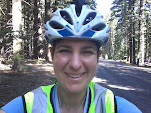The roads of Ghana in many ways are amongst the most comfortable roads there are for a cyclist. Overall bike mode share must be on par with the Netherlands or perhaps higher. The combined bike ped mode share is surely over 50%. Our fully loaded touring bikes stand out, but not because of the size of the load, only because they have gears, toeclips, dropbars, water bottle cages and canvas bags.
To see a child riding to school is common, perhaps a girl in hijab, perhaps a sibling or peer on the rear rack. To see someone carrying water, one 5-gallon jug in front, another in back, is common. To see a load of several bundles of the 8' tall grass they use for thatch roofs, ungainly strapped across the back resulting in a very wide load, not uncommon. To see a few cassavas strapped into the rear rack of a farmer's bike, common. To see a farmer's cutlass stashed in the frame, common.
And pedestrians. Always, everywhere, with every sort load, with every sort of mission. We are very funny looking here, so often they laugh. But also a warm greeting. "Obroni [white person]! You are welcome!" If they are not holding a load in place atop the head, both hands may be waving at us, and a big smile.
After 3 weeks of riding in Ghana, we're now in Cote d'Ivoire. The road scene is different. Bikes are perhaps no more common then back home in coastal California. The innkeeper at the humble guest house we stayed at a couple of nights ago in Dabakala was so excited to show us his bike, because he too is a cyclist, and rides it everywhere, while everyone he knows gets a moto of some sort as soon as they can manage it.
In both countries we have been on roads that would not warrant that name in the U.S. Braided dirt and sand tracks, with motos, pedestrians and bikes weaving around pits 5' deep.
The rules of the road also changed as we crossed the boarder. But in both cases we have been treated with courtesy and felt safer than riding back home. In Ghana, everyone asserts their right to a bit of space, and will sqeeze themself in wherever that space may be found. But also everyone is willing to make space for who everelse may need to sqeeze in too. Horns are used for all sorts of communication, though none seem to be agressive or angry.
In Cote d'Ivoire there is something of a pecking order, the bigger vehicle, the more others need to get out of its way. If the very large pothole to be avoided is in the truck's lane, it will use the other one, and the oncoming motos will scoot to the shoulder to get out of the way.
Monday, January 29, 2018
Subscribe to:
Comments (Atom)
